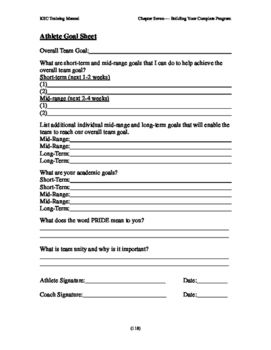Goal setting is crucial for every strength athlete, as it provides a roadmap to achieving success in their chosen sport. While physical training and nutrition play a significant role in improving performance, a psychological approach to goal setting can further enhance an athlete's mental focus, determination, and overall performance. This article will delve into the importance of goal setting for strength athletes and discuss practical strategies for adopting a psychological approach.
The Power of Goal Setting
Setting clear and meaningful goals provides athletes with a sense of purpose, direction, and motivation. Knowing what they want to achieve allows strength athletes to structure their training regimen effectively and track their progress. Goal setting also helps in setting priorities, managing time efficiently, and avoiding burnout
SMART Goals
One effective strategy for goal setting is using the SMART acronym:
- Specific: Goals should be well-defined, focusing on particular aspects of strength training, such as improving squat technique or increasing bench press weight.
- Measurable: Goals should be quantifiable, allowing athletes to track their progress accurately. For instance, setting a goal to achieve a specific one-rep maximum in deadlifts.
- Achievable: Goals should be challenging yet realistic, taking into account the athlete's current level of fitness and ability.
- Relevant: Goals should align with an athlete's long-term aspirations, whether it be participating in a national championship or setting a personal record.
- Time-bound: Goals should have a specific timeline, allowing athletes to set intermediate milestones and assess their progress over time.
Long-term vs. Short-term Goals
It is essential for strength athletes to set both long-term and short-term goals. Long-term goals provide athletes with a big picture view of what they wish to achieve in their athletic journey, while short-term goals establish stepping stones towards the long-term objectives. Breaking down long-term goals into smaller, manageable tasks provides athletes with a sense of accomplishment and keeps them motivated.
Process vs. Outcome Goals
When setting goals, strength athletes should consider both process and outcome goals. Process goals focus on the practice and actions required to improve performance, such as attending regular training sessions or incorporating specific exercises into their routine. Outcome goals, on the other hand, revolve around the desired results, like winning a competition or achieving a personal record. A balance between process and outcome goals ensures athletes stay motivated, even if the desired outcomes take longer to achieve.
Visualization and Mental Imagery
Visualization is a powerful tool that strength athletes can use to reinforce their goals and improve performance. By creating vivid mental images of successfully achieving their goals, athletes can enhance their confidence, focus, and motivation. Visualization can be incorporated into pre-training or pre-competition routines, where athletes take a few minutes to mentally rehearse their desired performance outcomes.
Creating an Action Plan
Once athletes have set their goals, it is essential to create an action plan outlining the steps needed to achieve them. The action plan should include specific training routines, nutritional guidelines, and recovery strategies. Breaking down the tasks into smaller, actionable steps helps athletes stay organized, motivated, and maintains their focus on the ultimate goal.
Monitoring and Adjusting Goals
Monitoring progress is crucial for strength athletes, as it allows them to make necessary adjustments and evaluate their performance. Regularly reviewing goals, tracking progress, and reassessing strategies ensures athletes stay on track. If certain goals become less relevant or unattainable due to changes in circumstances, athletes should not hesitate to modify or create new goals that align with their current situation.
Support and Accountability
Having a support system in place can greatly enhance an athlete's goal-setting experience. Sharing goals with coaches, trainers, or fellow athletes can provide valuable guidance, encouragement, and accountability. Being surrounded by individuals who understand the challenges and motivations of strength athletes fosters a positive environment and helps athletes stay focused on their goals.
Goal setting is not just about determining what an athlete wants to achieve; it is a psychological approach to improving performance in strength sports. By setting clear, SMART goals, incorporating visualization techniques, formulating action plans, and seeking support and accountability, strength athletes can enhance their mental focus, determination, and ultimately achieve success in their chosen sport. Remember, it's not just about physical training; it's about aligning the mind with the body and unleashing the true potential within.



